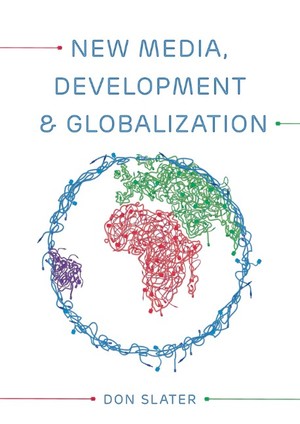Dr Don Slater’s new book asks how can we democratise the ways we think and practice new media, development and globalisation.
New media, development and globalisation are the key terms through which the future is being imagined and performed in governance, development initiatives, and public and political discourse. Yet these authoritative terms have arisen within particular cultural and ideological contexts. In using them, we risk promoting over-generalised and seemingly unchallengeable frameworks for action and knowledge production which can blind us to the complex global patterns and promises of diverse social realities.
New Media, Development and Globalisation: Making Connections in the Global South draws on more than 10 years of ethnographic fieldwork on new media in South Asia, Latin America and West Africa, including a two-year UNESCO programme of ICT research that included five innovative ICT-for-development programmes in India. The ethnographies are used to challenge the three terms in the title as voicing specific Northern narratives rather than universal truths, and to see them from the perspective of Southern peoples and communities who are equally concerned to understand new machines for communication, new models of social change and new maps of social connection.
The India-specific research reported in the book was part of a UNESCO-funded programme called ictPR (ICTs for Poverty Reduction). The programme funded nine media projects (five in India, plus one each in Sri Lanka, Nepal, Bangladesh and Bhutan). Each was chosen to explore different facets and models of ICT use in poverty reduction, and with a particular interest in the relationships between new and old media.
Rather bravely, UNESCO also funded a full-time ethnographic researcher attached to each project for up to two years. The aim was to move away from typical monitoring and evaluation studies to integrate knowledge production into project development; indeed, researchers were asked to explore the most fundamental questions – What are media? What is poverty? – as processes specific to their locale, and as processes that they could research and intervene in through their specific media projects.
The ictPR programme further explored strategies for generalising across projects through thematic discussions rather than quantitative indicators or other metrologies. The result was a platform for looking at relations between communications, development and global connections that did not presume the standard Northern framing concepts of media and development. This also allowed for considerable responsiveness and innovation on the part of project leaders and stakeholders.
For example, a project working with Muslim girls housed in a madrasa in Seelampur, New Delhi, started from a project proposal focused on using ICTs to enhance traditional women’s crafts (textiles and embroidery) through computer-based vocational training, computer-aided design and internet marketing. Within weeks of opening, however, the project staff and researchers found that the girls were using the facilities (both the ICTs and the meeting space) in unanticipated and unintended ways: they valued the ability to meet each other freely and make friends, to discuss topics of interest to them, to use the computers to tell multimedia stories and to design entirely non-traditional graphs and interior designs.
In most respects, they behaved more like Northern creative industries subjects than subjects of craft and development practices. Spatially, the ICTs themselves took second place to bulletin boards and banners announcing discussion themes for the week, and the chairs were more often than not turned into a discussion circle with their backs to the computer kit. The girls were quite clear about the ideas of freedom, creativity and innovation they could project in and through the project; they – and their mothers – were equally clear about how this project contradicted and potentially threatened their normative poverty reduction strategies—family advancement through educational credentials.
In this case, the project staff were not only responsive and open to effectively ripping up their project proposal (and were allowed to within this UNESCO programme), but the research model also allowed them to follow the girls back to their families and schools to understand the processes and the contradictions and tensions underlying their use of the centre.
Through such examples, New Media, Globalisation and Development seeks to make explicit the politics of research in this field, looking at the ways in which terms like new media, development and globalisation constitute frameworks which contain and constrain research agendas and detach them from the projects of those they claim to benefit. The central question the book poses is: How can we democratise the ways we think and practice new media, development and globalisation, opening these terms up to dialogue and challenge within North-South relations?
Dr Don Slater is Reader of Sociology at LSE’s Department of Sociology.








